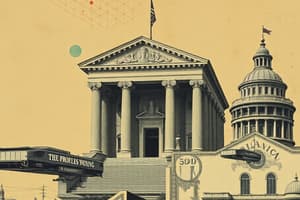Podcast
Questions and Answers
Which of the following is the MOST direct implication of fractional reserve banking?
Which of the following is the MOST direct implication of fractional reserve banking?
- Banks can lend out a portion of their deposits, creating new money in the economy. (correct)
- Banks must adhere to strict international capital standards known as the 'Basel Accords'.
- Banks are required to maintain a 100% reserve against all deposits to ensure stability.
- Banks are prohibited from engaging in investment activities to maintain financial stability.
A customer deposits a check into their current account. Which role are the banks performing when processing this transaction?
A customer deposits a check into their current account. Which role are the banks performing when processing this transaction?
- Investment intermediary, by investing the deposited funds.
- Payment agent, by facilitating the transfer of funds. (correct)
- Debt security issuer, by creating a new liability for the bank.
- Lending agent, by extending credit to the customer.
Which scenario BEST exemplifies how banks create new money through lending?
Which scenario BEST exemplifies how banks create new money through lending?
- A bank approves a mortgage, creating a new deposit for the seller of the home. (correct)
- A bank issues new banknotes to meet customer demand.
- A bank invests in government bonds, increasing its assets.
- A bank repays a loan it previously took from another bank.
A business seeks specific financial services tailored to its medium-sized operations. Which type of banking would be MOST appropriate for their needs?
A business seeks specific financial services tailored to its medium-sized operations. Which type of banking would be MOST appropriate for their needs?
In Islamic banking, which of the following practices is strictly avoided?
In Islamic banking, which of the following practices is strictly avoided?
Which of the following scenarios BEST illustrates the role of a central bank as a lender of last resort?
Which of the following scenarios BEST illustrates the role of a central bank as a lender of last resort?
A consumer uses a credit card to purchase electronics and plans to pay the full balance within the grace period. Which type of credit is the consumer utilizing?
A consumer uses a credit card to purchase electronics and plans to pay the full balance within the grace period. Which type of credit is the consumer utilizing?
A homeowner obtains a home equity loan (HELOC) to finance major renovations. What is the PRIMARY function of the home in this scenario?
A homeowner obtains a home equity loan (HELOC) to finance major renovations. What is the PRIMARY function of the home in this scenario?
Which fundamental principle is MOST directly protected by the banking secrecy law?
Which fundamental principle is MOST directly protected by the banking secrecy law?
To combat rising inflation, a central bank decides to decrease the money supply. What is the MOST likely, direct consequence of this action?
To combat rising inflation, a central bank decides to decrease the money supply. What is the MOST likely, direct consequence of this action?
Flashcards
What is a bank?
What is a bank?
A financial institution that accepts deposits and creates credit.
What are Basel Accords?
What are Basel Accords?
An international set of capital standards that ensure liquidity in banks..
What is Fractional Reserve Banking?
What is Fractional Reserve Banking?
A banking system where banks hold liquid assets equal to a portion of their liabilities.
What is branch banking?
What is branch banking?
Signup and view all the flashcards
What is mobile banking?
What is mobile banking?
Signup and view all the flashcards
What is Retail banking?
What is Retail banking?
Signup and view all the flashcards
What are Islamic banks?
What are Islamic banks?
Signup and view all the flashcards
What is collateral?
What is collateral?
Signup and view all the flashcards
What is Monetary Policy?
What is Monetary Policy?
Signup and view all the flashcards
What is expansionary monetary policy?
What is expansionary monetary policy?
Signup and view all the flashcards
what are capital markets
what are capital markets
Signup and view all the flashcards
personal banking
personal banking
Signup and view all the flashcards
investment banking
investment banking
Signup and view all the flashcards
corporate banking
corporate banking
Signup and view all the flashcards
private banking
private banking
Signup and view all the flashcards
insurance
insurance
Signup and view all the flashcards
consumer finance
consumer finance
Signup and view all the flashcards
forex trading(foreign exchange)
forex trading(foreign exchange)
Signup and view all the flashcards
Study Notes
Banks: Definition
- A bank is a financial entity accepting public deposits and creating credit.
- Lending happens directly or indirectly through capital markets.
- Banks are heavily regulated due to their importance in a country's financial stability.
- Fractional reserve banking: banks hold liquid assets equal to a portion of their liabilities.
- Banks must adhere to minimum capital requirements, per the "Basel Accords".
- Banks act as payment agents by managing checking or current accounts and enabling payments through ACH, telegraphic transfer and ATMs.
- Banks borrow by accepting deposits in current accounts or term deposits, and by issuing debt securities.
- Banks provide payment services, which makes bank accounts indispensable.
- Banks create new money when issuing loans, increasing the money supply; repayments decrease it.
- Banks undertake activities like personal, corporate, investment, private insurance, consumer finance, foreign exchange, commodity, equities, futures, and money market trading.
Banking Channels
- Branch: In-person banking at a retail location.
- ATM: Banking via automated teller machines.
- Bank by mail: Accepting deposits and communicating with customers.
- Online banking: Performing transactions over the Internet.
- Mobile banking: Using a mobile phone for banking transactions.
- Telephone banking: Conducting transactions via telephone with an operator or automated system.
- Video banking: Banking transactions or consultations via remote video connection.
- Relationship manager: Private or business banking representative visiting clients.
- Direct Selling Agent: Increasing the bank's customer base on a contract basis.
Retail Banking Products
- Savings account.
- Fixed deposit account.
- Certificate of Deposit (CD): Has a fixed term and fixed interest rate.
- Individual Retirement Account (IRA).
- Credit card.
- Debit card.
- Mortgage.
- Mutual fund.
- Personal loan.
- Time deposits.
- ATM card.
- Current accounts.
- Cheque books.
- Automated Teller Machine (ATM).
Business Banking Products
- Business loan.
- Capital raising (equity / debt / hybrids).
- Revolving credit.
- Risk management (FX, interest rates, commodities, derivatives).
- Term loan.
- Cash management services (lock box, remote deposit capture, merchant processing).
- Credit services.
Types of Banking
- Retail banking: Direct interaction with individuals and small businesses.
- Business banking: Services for mid-market businesses.
- Corporate banking: Services for large entities.
- Private banking: Wealth management for high-net-worth individuals and families.
- Investment banking: Activities related to the financial markets.
Types of Banks
- Commercial banks: Handle deposits and loans from corporations or large businesses.
- Investment banks: Underwrite stock and bond issues, trade, manage investments, and advise on capital market activities.
- Central banks: Government-owned, supervise banks, control interest rates, provide liquidity, and act as lender of last resort.
- Islamic banks: Adhere to Islamic law, avoiding interest and earning profit through markups and fees.
- Specialized banks: Help disadvantaged groups with low-interest loans for specific sectors or categories.
Types of Credit
- Credits include credit cards, loans, service credit, installment credit, and revolving credit.
- Loans: Enable obtaining cash, varying by amount, term and conditions with secured and unsecured types.
- Credit Cards: Used for buying on credit without interest if paid within the period.
- Departmental store cards.
- Travel & Entertainment Cards (T&E).
- Bank Credit Cards.
- Installment Credit: Repaid through installments with the item bought utilized as security.
- Home construction loan, Land loan, Home mortgage, Automobile loan, Home improvement loan, Student loan, Recreational vehicle loans or boats loans, Vacation loan, and Personal Loans are examples of installment credit.
- Service Credit: Monthly payments for utilities like gas, telephone, water, and electricity, which may incur late fees.
- Revolving Credit: Not repaid by installments.
- HELOC: Borrower uses home equity, often for major expenses.
- Line of Credit: Establishes a maximum loan balance accessed by the borrower.
Collateral
- Collateral is an asset offered to secure a loan.
- Lenders can seize collateral to recoup losses if payments are missed.
- Houses, cars, stocks, bonds, salary domiciliation, and cash are forms of collateral readily convertible to cash.
Banking Secrecy Law
- September 3rd 1956 law: requires all banks in Lebanon to maintain professional secrecy.
- Bank employees can't reveal client information, assets or holdings without authorization, except in cases of inheritance, bankruptcy, or litigation.
- Law allows communication among banks regarding debtor accounts and judiciary requests for illicit wealth cases.
Monetary Policy
- Monetary authority controls money supply, targeting inflation or interest rates for price stability and trust.
- Central banks influence interest rates by acting on the money supply.
- Actions include modifying rates, buying/selling bonds, and altering bank reserve requirements.
- The Federal Reserve, for example, manages it for the United States.
- Expansionary monetary policy increases money supply to lower unemployment and stimulate growth.
- Contractionary monetary policy slows money supply growth or decreases it to control inflation, potentially slowing economic growth.
- 1980's Federal Reserve intervention raised interest rates to 20% to curb inflation, causing a recession but keeping inflation in check.
Studying That Suits You
Use AI to generate personalized quizzes and flashcards to suit your learning preferences.




